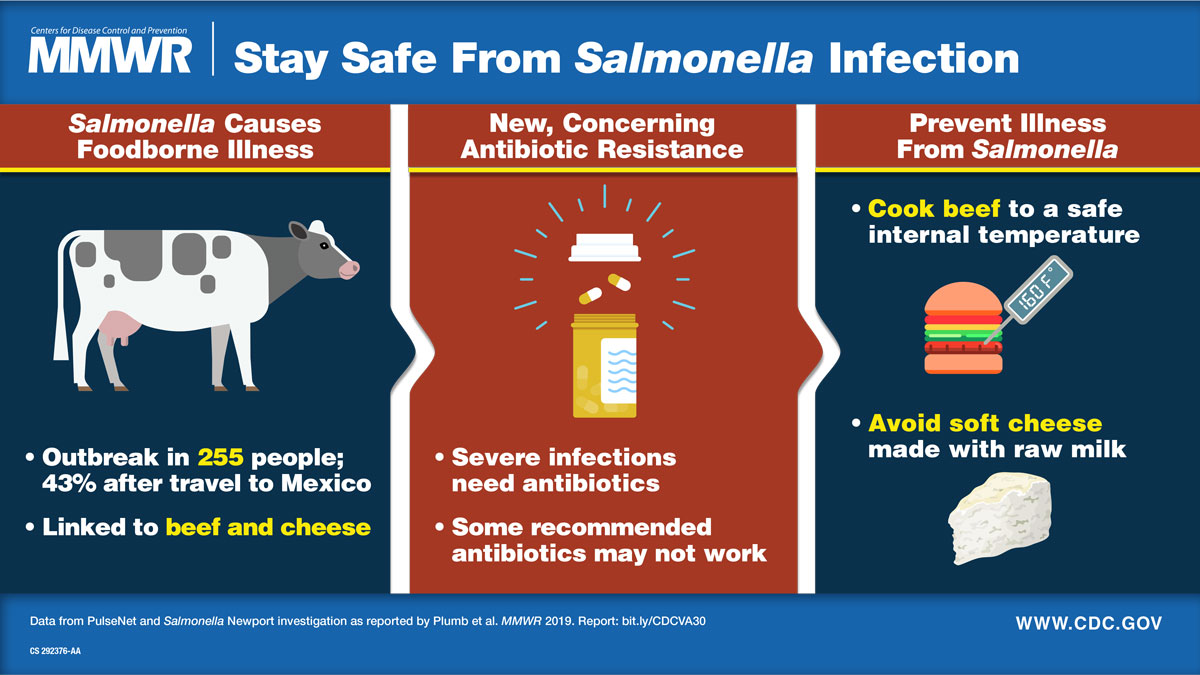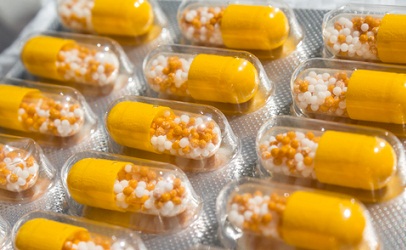Antimicrobial therapy or treatment with antibiotics is not recommended for uncomplicated gastroenteritis. Most cases of salmonellosis are not life-threatening and resolve on their own without complications.
 Outbreak Of Salmonella Newport Infections With Decreased Susceptibility To Azithromycin Linked To Beef Obtained In The United States And Soft Cheese Obtained In Mexico United States 2018 2019 Mmwr
Outbreak Of Salmonella Newport Infections With Decreased Susceptibility To Azithromycin Linked To Beef Obtained In The United States And Soft Cheese Obtained In Mexico United States 2018 2019 Mmwr
1 - 2 g.

Salmonella treatment antibiotic. Persons with severe diarrhea may require rehydration often with intravenous fluids. Recommended parenteral empiric therapy while awaiting sensitivities is. Treatment of invasive Salmonella disease bacteremia extraintestinal manifestations Empiric antimicrobial therapy should include a broad-spectrum cephalosporin cefotaxime or ceftriaxone.
Which antibiotics treat salmonella. Multidrug resistant non-typhoidal Salmonella strains are typically resistant to chloramphenicol ampicillin and trimethoprim plus possibly others Rowe et al 1997. Salmonella are more resistant to antibiotics.
There is no vaccine to prevent Salmonella infection. Judicious use of antibiotics among both humans and animals is imperative in the control of this pathogen. Typically people recover from salmonella without medical intervention in a four to seven-day timeframe.
Third-generation cephalosporins are also effective and often they are the first antibiotic given if a salmonella infection is suspected but not confirmed. 600 mgs - 12 g. Recommended empiric oral therapy.
Antibiotics for treating salmonella gut infections. About 400 people a year die from salmonella in the United States. Salmonella infection is diagnosed when a laboratory test detects Salmonella bacteria in a persons poop stool body tissue or fluids.
In severe cases Salmonella bacteria can get into the bloodstream and travel to the liver kidneys or other organs. Antibiotics are typically used only to treat people with severe illness. If salmonella is found in the sample antibiotics are not usually required.
Your child is less than 6 months old. If treatment is not started soon enough the infection can cause death. Salmonella may infect reptiles rodents and birds.
There appears to be no evidence of a clinical benefit of antibiotic therapy in otherwise healthy children and adults with non-severe salmonella diarrhoea. In recent years Salmonella typhi has also proved resistant to trimethoprim-sulfamethoxazole ampicillin and ciprofloxacin. However a very short course of an antibiotic may be needed if.
Some of these antibiotics are the same as or similar to those used in humans and have major implications for treatment of human infections when antibiotics are deemed necessary. The use of antibiotic drugs in treating the infection is proving less effective due to the alarming rise of antibiotic-resistant strains of Salmonella the effects of antibiotics on normal gut microflora and antibiotic-associated diarrhoea all of which bring a growing need for alternative treatments including the use of probiotic micro-organisms. The introduction of the drug is recommended to continue for another 2-3 days after normalization of body temperature and symptoms disappear.
When this happens the person must be treated with antibiotics. What should you do if you have salmonella. In fact antibiotic-resistant bacteria are becoming more common especially in the developing world.
However antibiotics are recommended for persons at. Salmonella infections usually resolve in three to seven days and many times require no treatment. 2-3 times a day for 7-14 days.
However some bacteria have been able to survive or grow despite the use of an antibiotic that previously was able to stop them. The first-line treatment for salmonella infections are fluoroquinolones such as ciprofloxacin and azithromycin. Or Ceftriaxone IV 100 mgkg 24 hourly maximum 4 gday.
Selection of antibiotics See Footnote C Choice of antibiotics depends on antibiotic sensitivities of Salmonella sp. People at risk for complications or those with particularly severe illness or a weakened immune system may need antibiotic therapy. In uncomplicated cases of the infection antibiotics arent recommended.
Antibiotics appear to increase adverse effects and they also tend to prolong salmonella detection in stools. Cefotaxime IV 50 mgkgdose maximum 2 gdose 6-hourly. Patients should drink extra fluids as long as diarrhea lasts.
Once a day not more than 10 days. Antimicrobial Resistance The selection of effective antibiotics is critical for the treatment of invasive Salmonella infections. As AMR and MDR continue to spread among Salmonella strains and other bacterial species the burden.
Antibiotics are active against the Salmonella Typhi. Most people recover without specific treatment. These bacteria are said to be antibiotic-resistant.
Antibiotic Resistance In Salmonella Enteritidis Isolated From Broiler Carcasses
 Options For The Antibiotic Treatment Of Enteric Fever Caused By Download Table
Options For The Antibiotic Treatment Of Enteric Fever Caused By Download Table
 Treatment For Salmonella Infection About Salmonella
Treatment For Salmonella Infection About Salmonella
 Mics µg Ml Of 18 Antibiotics For Salmonella Typhimurium Strains Download Table
Mics µg Ml Of 18 Antibiotics For Salmonella Typhimurium Strains Download Table
 Pdf Antibiotic Resistance And The Prospects Of Medicinal Plants In The Treatment Of Salmonellosis Semantic Scholar
Pdf Antibiotic Resistance And The Prospects Of Medicinal Plants In The Treatment Of Salmonellosis Semantic Scholar
 Antibiotic Resistant Salmonella A Rare But Growing Concern In Canada Food Safety News
Antibiotic Resistant Salmonella A Rare But Growing Concern In Canada Food Safety News
 Antibiotic Treatment Selects For Cooperative Virulence Of Salmonella Typhimurium Sciencedirect
Antibiotic Treatment Selects For Cooperative Virulence Of Salmonella Typhimurium Sciencedirect
 Effect Of Antibiotic Therapy In Acute Salmonellosis On The Fecal Excretion Of Salmonellae Nejm
Effect Of Antibiotic Therapy In Acute Salmonellosis On The Fecal Excretion Of Salmonellae Nejm
Sensitivity Pattern Of Salmonella Serotypes In Northern India
Https Www Microbiologyresearch Org Content Journal Micro 10 1099 Mic 0 000709 Crawler True Mimetype Application Pdf
 Csf Findings On Admission And After 12 Days Of Antibiotic Treatment Download Table
Csf Findings On Admission And After 12 Days Of Antibiotic Treatment Download Table
Salmonella Enteritidis Meningitis In An Infant Case Report And Literature Review

/salmonella-treatment-4164292-FINAL-20f18c88ed5f43b2a8faefe47e21f71b.png)
Tidak ada komentar:
Posting Komentar
Catatan: Hanya anggota dari blog ini yang dapat mengirim komentar.